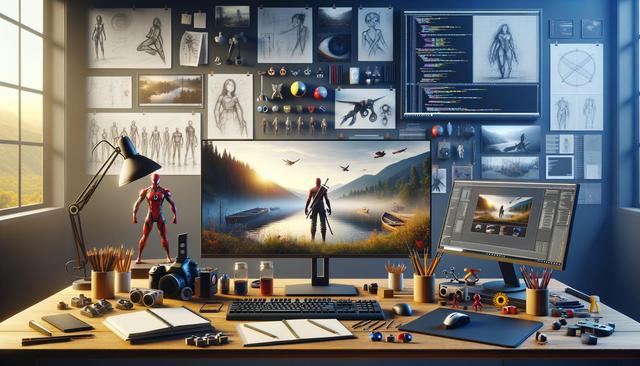Understanding the Role of a Game Developer
Game development is a multifaceted profession that brings creativity, technology, and storytelling together to create immersive digital experiences. A game developer can work on a variety of platforms, from mobile devices to consoles and desktops. These professionals are responsible for coding the mechanics, designing gameplay features, and collaborating with artists, writers, and sound designers. Whether you’re interested in becoming a game app developer or focusing on complex game engines, there are many paths to explore in this dynamic field. The role may vary depending on the size of the team—a full stack game developer may handle both front-end and back-end processes in smaller teams, while larger studios often break these responsibilities into specialized roles.
Game developers often work with cross-functional teams and must understand the fundamentals of game design, programming languages, and software development. Some core skills include:
- Proficiency in languages such as C++, C#, or JavaScript
- Experience with game engines like Unity or Unreal
- Strong problem-solving and debugging abilities
- Understanding of 2D and 3D graphics programming
As the demand for gaming content continues to grow globally, more opportunities are arising for mobile game developers and unreal developers to contribute to this ever-changing industry.
Educational Paths and Training Opportunities
Becoming a game developer typically starts with a strong foundation in computer science or software engineering. Many aspiring developers choose to attend game developer schools that offer specialized curriculums tailored to the industry. These programs often cover a wide range of topics such as game theory, animation, artificial intelligence, and physics simulation. Some institutions also provide hands-on experience with tools commonly used by unity 3d developers and unreal developers, preparing students for real-world challenges.
While formal education is beneficial, it’s not the only option. Numerous online courses, bootcamps, and self-taught resources are available for those who prefer a more flexible learning path. Whether you attend a traditional program or pursue self-guided education, it’s essential to build a portfolio that showcases your skills. This could include:
- Playable game prototypes
- Source code repositories
- Documentation of your design process
- Video walkthroughs or gameplay demos
For those starting out, roles like junior game designer can serve as a valuable entry point into the industry, offering practical experience while continuing to grow technical and creative capabilities.
Choosing a Specialization in Game Development
Game development is a broad field with many areas of specialization. Depending on your interests and strengths, you may choose to become a mobile game developer, unity 3d developer, or even a full stack game developer. Each role requires a unique set of skills and focuses on different aspects of the gaming experience. For example, mobile game developers often work with constraints related to device performance and screen size, requiring efficient coding practices and user-friendly design.
Specializations to consider include:
- Game programming: Focuses on the technical aspects of game mechanics and systems
- Game design: Involves crafting the rules, storylines, and user interactions
- Art and animation: Creates the visual assets and animations for the game
- Sound design: Develops audio effects and music to enhance immersion
Becoming an unreal developer might be ideal for those interested in high-end console or PC game development, while unity 3d developers often work across platforms including VR and mobile. Understanding your preferred area can help guide your career and educational choices.
Tools and Technologies Game Developers Use
To bring virtual worlds to life, game developers rely on a variety of tools and software. Game engines like Unity and Unreal Engine are industry standards and are used by both beginners and professionals. Unity 3d developers appreciate the engine’s versatility and support for 2D, 3D, VR, and AR experiences, while unreal developers often leverage the engine’s powerful graphics capabilities for more visually intensive projects.
Other essential tools include:
- Version control systems like Git
- 3D modeling software such as Blender or Maya
- Audio editing tools like Audacity or FMOD
- Project management platforms like Trello or Jira
Staying updated with the latest in game development trends and tools is crucial. Many developers participate in game jams, online communities, and conferences to hone their craft and network with others in the industry. Whether you’re a junior game designer or a seasoned full stack game developer, continuous learning is key to staying relevant.
Building a Career in Game Development
Turning a passion for games into a career requires dedication, practice, and a willingness to learn and adapt. The journey can begin with small personal projects and evolve into professional roles such as a game app developer or junior game designer. Building a strong portfolio and gaining experience through internships, freelance work, or collaborations are crucial steps in demonstrating your capabilities to potential employers.
Networking also plays a vital role. Engaging with online forums, attending game development meetups, and participating in hackathons can open up opportunities and connections. Additionally, many developers find success working as indie creators, launching their own games independently or with small teams. With platforms that support self-publishing, mobile game developers and unity 3d developers have more options than ever to showcase their work.
Career progression in this field can lead to roles such as technical director, lead designer, or even studio founder. As a full stack game developer, having a broad skill set can open doors to leadership positions and larger projects. While the path may vary for each individual, a combination of technical knowledge, creative vision, and strong collaboration skills will always be valuable assets.
Conclusion: Bringing Your Vision to Life
The world of game development offers incredible opportunities for those who are passionate about technology, storytelling, and interactive media. Whether you aim to be a mobile game developer, unity 3d developer, or full stack game developer, there’s a place for your skills and ideas in this evolving industry. By choosing the right educational path, exploring different specializations, and continuously building your portfolio, you can transform your enthusiasm into a fulfilling career. Starting as a junior game designer or experimenting with personal projects are effective ways to gain momentum. With persistence and creativity, you can play a part in bringing virtual worlds to life.












